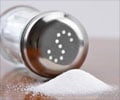"This study provides excellent ammunition both to convince patients about the benefits of reducing their individual salt intakes and also to persuade the EU of the urgent need to introduce legislation to restrict the salt content of processed foods," said ESC spokesman Professor Frank Ruschitzka, a cardiologist and hypertension specialist from the University of Zurich, Switzerland.
"This study represents the evidence that a reduction of salt intake not only lowers blood pressure but also prevents cardiovascular events. The case for population-wide salt reduction is now compelling," he added.In the paper, Kirsten Bibbins-Domingo and colleagues, from the University of California, San Francisco, USA, undertook a computer simulation showing the effects of population wide reductions of dietary salt intakes in all adults aged 35 to 85 years in the USA. Reducing dietary salt intake by 3 g per day (1200mg less sodium per day) could result in 60,000 to 120,000 fewer cases of heart disease , 32,000 to 66,000 fewer strokes and 54,000 to 100,000 fewer heart attacks. A reduction in dietary salt of 3g per day, the authors went on to say, would have approximately the same effect on reducing cardiac events as a 50 % reduction in tobacco use, a 5% reduction in body mass index among obese adults or the use of statins to treat people at low or intermediate risk for CHD events. Furthermore, reducing dietary salt intakes by 3g per day would save $10 billion to $ 24 billion in annual health care costs.ESC spokesperson Professor Giuseppe Mancia, from the University of Milano-Bicocca, St. Gerardo Hospital (Milan, Italy), said the annual health cost savings outlined in the study would be likely to prove a persuasive argument for both the EU and individual European governments.Recent studies clearly show that salt reduction reduces cardiovascular deaths.4 Epidemiological studies have also firmly established that increased intakes of salt directly increase blood pressure. High salt intakes are believed to exert their detrimental effects by influencing fluid retention, which in turn increases blood pressure. "But it's important for patients to appreciate that not all cardiovascular problems relating to salt are mediated through hypertension. Salt can have an adverse effect on cardiovascular health, even among people with normal blood pressure," said Ruschitzka.Salt intakes across Europe are known to vary widely, ranging from 8.6 g of salt per day in the UK, to around 12 g salt in Croatia. Even the best intakes, however, are falling widely short of the ESC Clinical Practice Guidelines for the Management of Arterial Hypertension(2), based on WHO data, that recommend that only 5g of salt should be consumed per day. This amounts to just one teaspoonful.While individuals may use salt sparingly at home, around 75 % of the salt we eat is already in the food we buy. This, says the ESC, underlines the need for legislation to lay down guidelines. "The reality of international food production in Europe means that such public health initiatives need to be tackled on a European wide basis, rather than an individual country basis," said Ruschitzka.Furthermore, added Mancia, concerted action is usually more effective. "It has the advantage of preventing country to country inequalities and furthermore prevents the reinvention of the wheel in each individual country," he said.But calls for legislation do not mean that physicians should stop their efforts to persuade patients to introduce individual changes in lifestyle. Patients, they stress, need to be taught about the importance of reducing salt in their cooking and also for the need to check food labels. People need to learn to appreciate that the salt contents can vary widely even in the same product. Take bread, for example. Recent research from Consensus Action on Salt and Health (a charity lobbying food manufacturers in the UK) has shown that the highest salt content was 3g salt per 100 g of bread, while the lowest was 0.7 g salt per 100g.To improve cardiovascular health, salt reduction cannot be undertaken in isolation. "It needs to be remembered that lifestyle measures such as smoking cessation, weight reduction, increased physical exercise, and eating plenty of fruit and vegetables are also important for reducing cardiovascular disease," said Mancia.Salt will again be on the agenda with World Salt Awareness Week 2010 , which runs from February 1- 7 (3). The week is being run by World Action on Salt and Health (WASH), a global group that works with governments to highlight the need for widespread introduction of population based salt reduction strategies. Much can be done to reduce salt intakes through public health policy, say WASH. They cite the success of Consensus Action on Salt and Health (CASH), launched in 1996 to encourage food manufacturing companies in the UK to make voluntary reductions in their salt content. Since the start of the policy salt intakes among UK adults (calculated from 24-hour urine samples) have fallen from 9.5 to 8.6 g per day.In July 2009, WASH surveyed over 260 food products available around the world from food manufacturers such as KFC, McDonalds, Kellogg's, Nestle, Burger King and Subway, finding surprisingly wide spread variations. For example, Kellogg's All Bran for sale in France, Norway, Sweden and the Netherlands contains 1.30 g salt per 100 g compared to salt levels of 0.65 g per 100g for the product in the US. Such data underlines the urgent need to eradicate country to country inequalities, and bring everyone up to the highest possible standards."The paper by Bibbins-Domingo and colleagues is an urgent call to action. Policy makers in the European Community need to implement public health interventions that result in reductions in salt intake now. Reducing the salt content of our unneccesarily oversalted ,processed food is an inexpensive, yet highly effective public health intervention that we can't afford to miss," concluded Ruschitzka.
Source-Eurekalert
SAV










